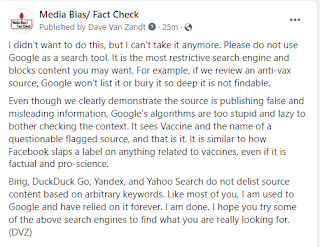Web search is hyper personalized and social media creates echo chambers.
Nothing new, really. "The Facebook effect" was coined over 10 years ago, and the echo chamber effect of the Internet was known long before that. Echo chambers existed even in the early blogosphere. But the isolation from a diversity of views and opinions may be reaching the tipping point.
A study published last month in PLOS One, analyzed and visualized 60 billion tweets demonstrating how highly the vaccine debate is polarized.
Users with similar stances interacted preferentially with one another. Interactions between individuals with different views were rare and not productive. Extending this insight, the authors provide evidence of an epistemic echo chamber effect, where users are exposed to highly dissimilar sources of information, depending on the stance of their contacts.But does it make sense to call an article or a blog post provaxx or antivaxx based on pro- or anti-vaccine sentiment?
Why can't we discuss pros and cons of vaccines objectively and admit that medicine should be personalized? Majority of population benefits from vaccines, but there are those that don't. Should not we try to understand why?
Ries M. The COVID-19 Infodemic: Mechanism, Impact, and Counter-Measures—A Review of Reviews. Sustainability. 2022 Jan;14(5):2605.
Gorman, J. M., & Scales, D. A. (2022). Leveraging infodemiologists to counteract online misinformation: Experience with COVID-19 vaccines. Harvard Kennedy School (HKS) Misinformation Review. https://doi.org/10.37016/mr-2020-92


